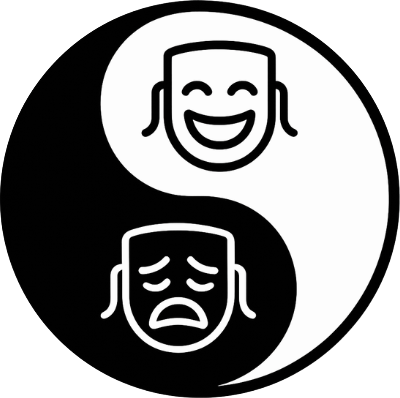Spiritual Beings Having an Actor's Experience
"We are not human beings having a spiritual experience. We are spiritual beings having a human experience." ~ Pierre Teilhard de Chardin
We've been dancing around writing this post for a while, but given we consider spirituality a key component of holistic well-being in our (working) model of actor peak performance, decided it was better to attempt – even if imperfectly – than not at all.
Before we dive in, however, let's clarify what "spirituality" means in Dojo land. Although we recognise it's a word that often comes with unhelpful connotations, it's the most accurate one we've found for capturing the essence of what we're talking about: a belief in something beyond us.
For some, this will be prescribed by an organised religion; for others, this absolutely, 1000% won't. "Nature", "the Universe", or "Soul" are as valid names as "Allah", "Buddha", or "God". At the end of the day, these are all just labels for that which cannot be labelled.
Semantics addressed, let's have a chat about why we believe spirituality matters on the actor's path and what it might look like.
Backed by science; built for the stage and screen.
👊 Actors:
Get evidence-informed insights and strategies to support your performance and well-being. Join the Dojo e-newsletter tribe and make thriving your reality.
🧭 Drama schools & Production companies:
Bring pioneering, research-backed coaching into your classroom or rehearsal room. Let’s talk about supporting your actors to perform at their peak – and stay well in the process.
Spiritual beings
Let's start with the Teilhard de Chardin quote we opened with: "We are not human beings having a spiritual experience. We are spiritual beings having a human experience". Another spin on the same sentiment comes from Jon Gordon: "We are not a body with a soul. We are a soul and spirit with a temporary body".
These statements obviously have implications for non-actors too, but as we actor folk can get mighty wrapped up in our actor identity, are worth us unpacking for a moment.
When spirituality doesn't have a place in one's life, it's easy to forget that the material world is but the tip of the iceberg. To be precise, visible matter – i.e., everything everywhere we can see – makes up only about 5% of the universe.[1] Dark matter, which we still don't completely understand, makes up roughly 27%, and the remaining 68% is dark energy (which we also don't completely understand).[2]
The material world is pretty damn compelling, though, so if we don't regularly reconnect to nature, our soul, the Buddha, [insert label of choice], we can fall for believing it's all there is. And while one can certainly live within this illusion, it would be a shame to limit one's entire experience to the known and tangible 5%. The fact that the non-physical accounts for over 95% of our universe is no trivial thing.
Actor's experience
Of course, these truths could make a case for spiritual practices for non-actors and actors alike, but there are a few actor-specific arguments, too.
If you've spent any time in or around the Dojo, you'll have heard us talk about "controlling the controllables". We hammer this hard because the reality is we don't control a whole bunch on the actor's path, and – for the sake of our sanity – it's important we acknowledge this. We're not doing it wrong; it's the game we've signed up to play.
When we have a way of recalibrating perspective (i.e., a spiritual framework), the rejections, setbacks, and challenges inherent to the actor's experience become more tolerable. They still suck, but they don't lead to the same depths of despair and hopelessness. And, let's face it, the day getting a "no" stops sucking is the day we stop caring, and the day we probably want to reevaluate the game we're playing.
Again, we don't see spirituality as needing to be some big, grandiose thing here at the Dojo. It can be, but it doesn't have to be. Simple mantras like, "Everything is divinely orchestrated", "Rejection is divine redirection", or even, "Hmm... Given super-duper smart science people still don't understand 95% of the universe, it's possible I might not understand why I didn't get that role" are as good as any place to start.
If you'd like to voyage further but organised religion isn't your jam, why not test drive one of the wide-ranging practices from the world's countless wisdom traditions? From yoga to volunteering to forest bathing, there's something, somewhere, for everyone. Alternatively, you could turn to one of the practices shared by many: carving out a quiet moment to pray, meditate, or journal.
Another option is adopting a non-religious book as your personal "Bible". I did this in my final year of drama school with Paolo Coelho's The Alchemist, reading it every night before I went to sleep. Others have done the same with the poetry of Mary Oliver and Rumi. We don't need to be overly precious. Roll with whatever practice that delights, inspires, and restores you.

All this to say, we need spiritual nourishment in order to thrive. What and how you serve it is your call, but make sure you're getting fed.
Love what you’re reading? Help us keep it flowing. Donations support the research, writing, and free sharing of evidence-informed tools for actor performance and well-being. Every dollar fuels our mission to make thriving a reality for actors everywhere 🔥
Citations
Cite us!
IG: @theactorsdojo
APA 7: Norrish, T. (2024, March 15). Spiritual beings having an actor's experience. The Actor’s Dojo. https://www.dojoactors.com/spiritual-beings/
